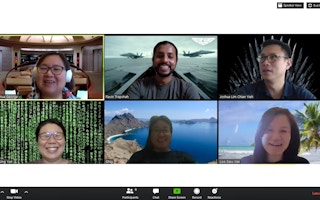The last few weeks have been a test of how adaptable humans are, said Perpetua George, who has spent just under a month in lockdown, trying to manage the sustainability operations of the world’s largest palm oil company from her family home in Kuala Lumpur.
To continue reading, subscribe to Eco‑Business.
There's something for everyone. We offer a range of subscription plans.
- Access our stories and receive our Insights Weekly newsletter with the free EB Member plan.
- Unlock unlimited access to our content and archive with EB Circle.
- Publish your content with EB Premium.
Sustainability jobs that require fieldwork have mostly stopped in response to lockdown orders to contain the Covid-19 pandemic. Globally, the number of available jobs in conservation has fallen by half, and large chunks of sustainability roles have pivoted online, practitioners swapping binoculars for satellite monitoring software.
Desk-based jobs have changed too. Consultants are finding that sustainability teams in governments and corporates have been redeployed to help combat the virus, so are having to be creative to justify their paychecks.
It’s not just doing a job that’s proving difficult, but keeping a positive frame of mind while working from home. Norizan Mazlan, conservation lead for environmental group World Wide Fund for Nature (WWF) in Malaysia, is lucky enough to have a garden for her, her husband and school-age children to escape to.
“
We are not just working from home. We are at home, trying to work in a crisis. Our priority should be ensuring our family is safe. Work should come a close second.
Norizan Mazlan, head of conservation, Peninsular Malaysia, WWF-Malaysia
She has set rules for work-time, exercise, and conversation etiquette to make working from home work for her family. “Being at peace at home helps in being more effective at work,” said Norizan.
As the number of coronavirus cases in Asia continues to rise, Eco-Business asked a journalist, an activist, an entrepreneur, a consultant, a holiday resort operator, and a corporate sustainability manager in Malaysia, Indonesia, Singapore, Vietnam and Hong Kong how they’re staying effective under unprecedented working conditions.
Norizan Mazlan, head of conservation, Peninsular Malaysia, WWF-Malaysia
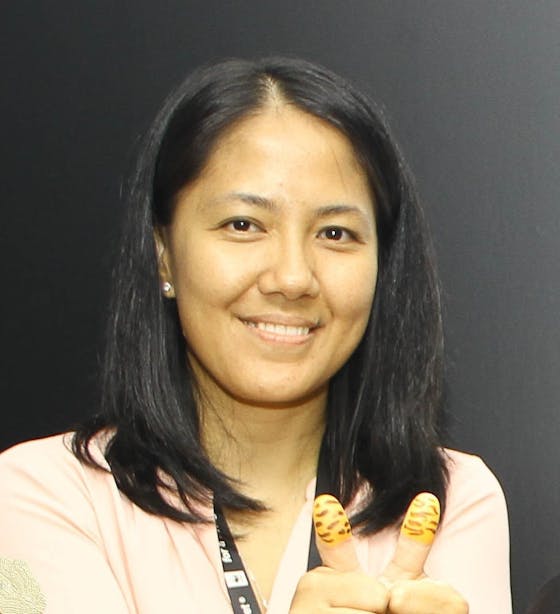
Norizan Mazlan, head of conservation, Peninsular Malaysia, WWF-Malaysia
Norizan Mazlan’s husband is a doctor who still goes to work to see his patients despite the country-wide lockdown. So during the day, WWF-Malaysia’s conservation head works from home with the children. She sits with her kids around the dining table, which doubles as an office area, where they work, eat and play together. “We are all in one room for most of the day. This can be distracting, but it’s a trade-off. I can only work effectively when my children are safe and their needs are taken care of,” she said.
Though some members of Norizan’s team, such as anti-poaching patrol officers, have continued to work in the field, the work plan has been adapted for lockdown; analysis of camera traps and indigenous community social survey data, for instance, can be done virtually. So can advocacy work, to some extent, through videoconferencing.
Norizan said the pandemic should be a “wake-up call” for humanity to recognise that nature deserves respect, and indicators for success and growth need to shift towards inclusivity and sustainability, in line with WWF’s mission. But for her team to have impact during lockdown, Norizan stresses the importance of empathy. Some staff might have small children and no help at home, others might be responsible for their elders or struggling financially, she said.
“Anything that can help which, before might have seemed trivial, is important now,” said Norizan, adding that cooking recipes that require only one pot and minimal ingredients help her manage time. “I still need to get back to work after cooking and cleaning. Sharing actions which can improve our time management and reduce stress are priceless.”
Perpetua George, general manager, group sustainability, Wilmar International
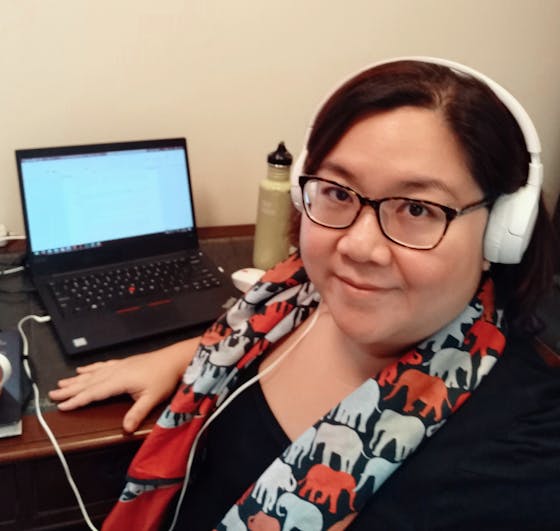
Perpetua “Pep” George, Wilmar’s GM of sustainability, working from home.
The last few weeks have been a blur for the world’s largest palm oil trader’s sustainability team. The first task, completed in early March, was drawing up new standard operating procedures for if Malaysia went into lockdown. Pragmatic stuff, like the purchasing department buying hand santiser, face masks and disinfectant. “When it [lockdown] happened, it was a shock. Nobody thought it would get to this point,” said Perpetua George, Wilmar’s sustainability general manager. There was then a scramble to get travelling executives safely home.
That was what George calls the “shock and awe phase”. Now, it is about executing the plan. A headache for locked-down palm oil firms is sticking to sustainability certification requirements. But the Roundtable on Sustainable Palm Oil (RSPO), a certification standard, is now asking growers to do some audits virtually, for instance, analyse satellite imagery, and resume on-ground audits when travel is possible again. “In a way we’re lucky. Sustainability monitoring over the last five years has become more desk-based. We can use Microsoft Teams or Zoom—as long as auditors can look at what they need to,” said George.
Her biggest worry for now is keeping her team motivated. “Working from home for the first week is great. After that, it can be debilitating and isolating.” The company keeps to a weekly schedule for teams to check in, using video chat apps Zoom and Skype. “Video feels more human. Just sending emails doesn’t work,” said George, adding that numerous WhatsApp groups keep the “water-break chatter” going.
Bustar Maitar, founder and CEO, EcoNusa Foundation
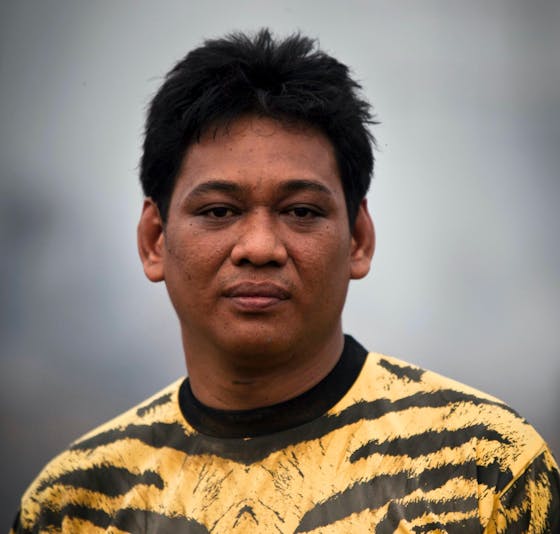
Bustar Maitar, founder and CEO, EcoNusa Foundation
Bustar Maitar campaigned for the protection of Indonesia’s forests with Greenpeace for 11 years before starting his own venture, sustainability consultancy EcoNusantara. He later set up EcoNusa Foundation, a non-profit focused on sustainable development in Papua. Now stuck in Jakarta and unable to travel, Maitar’s work—which includes community-based eco-tourism, indigenous trade and forest monitoring—is largely on hold.
“The outbreak immediately changed how I work,” said Maitar, who jogs and listens to rock music to keep up his energy levels. “My job involves meeting many people and travelling to remote areas. Now everything has to stop and shift to online mode. But convincing people [of the value of sustainable development] is very different by online communication.” So is analysing evidence of deforestation, which he says is easier using the trained eye than an online monitoring system.
Links have been made between deforestation and the likelihood of disease outbreaks like Covid-19, and Maitar said now is the time to think creatively about how to highlight those connections to protect Indonesia’s forests. “Opening up forests on a large scale is like opening Pandora’s box. We could be unleashing diseases we’ve never known before,” he said. “We need to use the pause that Covid-19 has given us to address environmental concerns that could become even more grave in the future.”
Navneet Kaur, founder and CEO, Yours
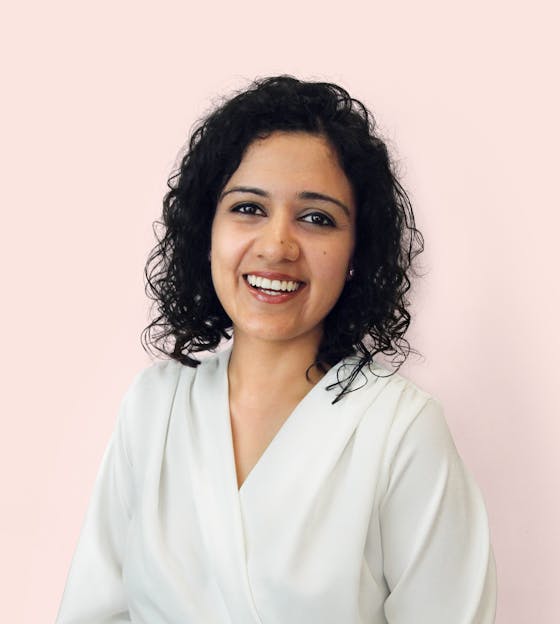
Navneet Kaur, co-founder and CEO, Yours
The co-founder and chief executive of earth-friendly skincare startup Yours has been working from home in Singapore for the last four weeks with her husband, the company’s marketing director. Concerned about the wellbeing of her customer-base (Yours is less than two years old), the India-born entrepreneur has launched a campaign on Instagram, #ThisTimeIsYours, to keep people’s spirits up with “a daily dose of positivity to your living room”, by way of motivational quotes, skincare tips, photography, and so on. The campaign has helped grow her business. Last week was Yours’ best ever for sales. “People now have time on their hands, and we’re finding that skin care is part of self care—people want to pamper themselves while they’re staying at home,” said Kaur.
But bumper sales may not last forever in this business climate. “We will struggle in two months’ time, if supply chains don’t open up,” said the former Uber executive. “The virus has impacted our product launch plans. We were going to launch cleansers and toners. That will get delayed.” To prevent the supply of the packaging running out, Yours has set up packaging sources across different countries to diversify the risk, and implemented strict hygiene standards for each potential supplier, Kaur noted.
Nadiah Rosli, freelance journalist and project director, Malaysia, Internews Network
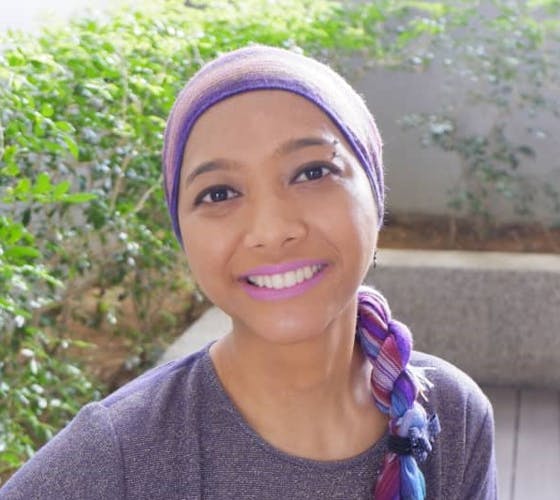
Nadiah Rosli, project director, Malaysia, Internews Network
The last story Nadiah Rosli wrote was on the influence of religion on climate action for Southeast Asia-focused publication New Naratif in February. In the weeks since, as a shock change in government upended Malaysian politics and Covid-19 forced Malaysia into lockdown, there has been less appetite for the sort of stories she writes. “Environment stories are not being highlighted as the moment,” she said, adding that a government proposal to degazette a forest reserve in Selangor warranted more coverage.
Rosli said there’s now an opportunity for stories that explore the connection between diseases like Covid-19, the environment and wildlife conservation. Which is what she’s pursuing in her other role as Malaysia project director of Internews Network, an NGO that trains and funds journalists. Rosli said that while most Covid-related journalism can go digital to reach most of Malaysia, reaching indigenous communities calls for more creativity. Hence, her plan to communicate with people living in remote areas through radio.
Reporting on indigenous communities requires particular caution now, she added. “We want to report on-the-ground about how vulnerable communities are affected by Covid-19, but we don’t want to be selfish and put them at risk of infection.”
Andrew Dixon, director, Nikoi Island
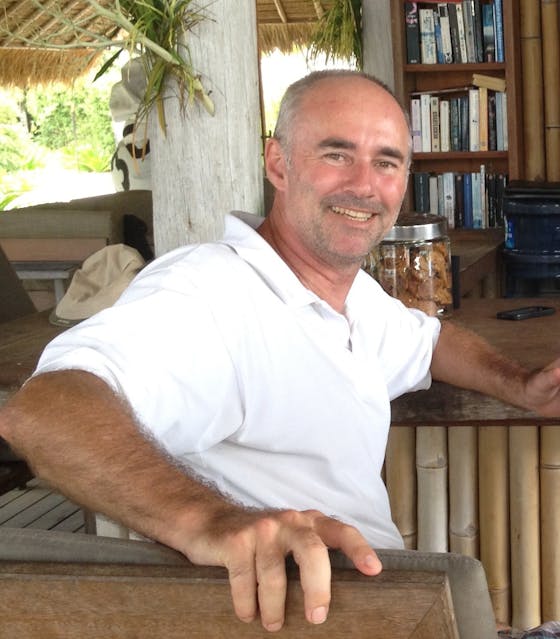
Andrew Dixon, director, Nikoi Island
Andrew Dixon runs a private island resort off the coast of Bintan, Indonesia, where sustainability is a key selling point. The resort was running normally until 16 March, although the number of guests had dropped off over what is usually one of the busiest periods of the year. When Singapore introduced travel restrictions, arrangements were made for guests to leave within 24 hours.
A skeleton crew stayed on the island to shut operations down. Leftover food was given to staff and the local community. A chat group was set up to tackle misinformation spreading online about the virus. The Island Foundation, an education charity the resort runs, set up handwashing stations in local villages, provided information on proper handwashing and social distancing, and repackaged education modules so children could learn at home.
The resort is mainly powered by solar, with biodiesel-powered generators as backup for four hours a day. With no guests on the island, the generators are now being used for just an hour a day. Spare time not spent attending to guests is now being used to train staff on how to make and sell takeaway food to the local market and sell products like the resort’s own muesli and sambal to Singapore. Staff are also being encouraged to collect plastic from the beaches to feed the resort’s plastic recycling machines. The resort’s permaculture farm on Bintan is supplying staff with most of their food, and staff are also being trained in permaculture techniques to grow food for their own families.
“We are optimistic that some good will eventually come out of this,” said Dixon. “It is during periods like this that we really value the efforts we’ve put into trying to be as sustainable as possible, as it means we can much more easily reduce overheads.”
Kim Lê, CSR manager, CleanDye, and co-founder, CL2B
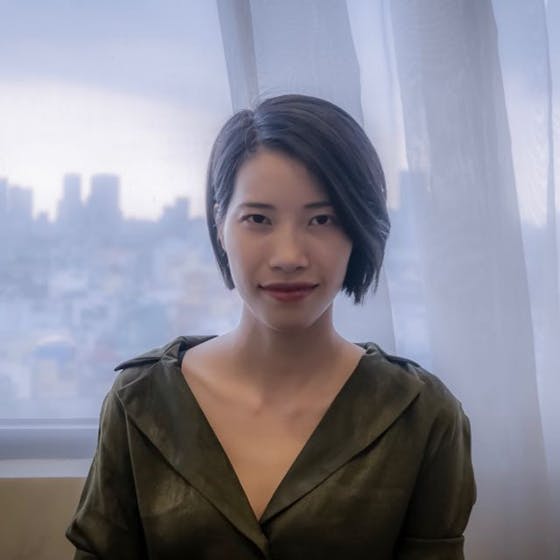
Kim Lê, CSR manager, CleanDye
One of the biggest problems the pandemic poses for businesses is that it has made collaboration much harder, observes Kim Lê, who straddles two jobs, one as corporate social responsibility manager for sustainable dye firm CleanDye, and the other, running circular economy consultancy, CL2B.
Based in Ho Chi Minh City, Lê’s movements haven’t been as restricted as in harder hit countries like Malaysia. She still goes to work in CleanDye’s factory on most days and works from home the rest of the time. With government subsidies and other revenue sources ebbing, Lê said that now is the time for the business to focus on “building internal value”. She is working on new strategies to strengthen her business, and plan for when the virus is brought under control in Vietnam.
Lê said that while businesses will need a few months to recover, she is hopeful that sustainability ventures like hers will benefit from the coronavirus-induced downturn. “I think Vietnam will be more proactive and look to develop domestic strength through innovation rather the rely on globalisation and international trade—and sustainable businesses should receive more investment as a result,” she said.
Hanah Paik, Asia Pacific lead, cities, states and regions, CDP
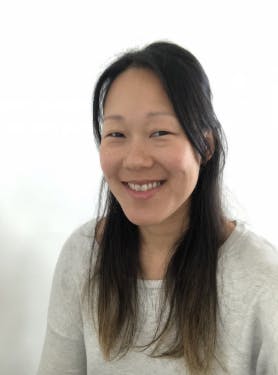
Hanah Paik, Asia Pacific lead, cities, states and regions, CDP
Hanah Paik works with governments and companies around the region to measure, manage and disclose their environmental impact. Although Hong Kong, where Paik is based, is not under strict lockdown, events in Australia, New Zealand, South Korea and Vietnam have been cancelled, and workshops with companies on science-based targets have had to be changed.
Paik’s job has been made harder as some city governments have closed what are considered non-essential departments, including climate change and sustainability teams, or redeployed them to support virus containment efforts. “We have had to be more flexible and sensitive around our annual request to cities, states and regions, and companies to disclose their environmental data this year,” she said.
Though disruptive, Paik said that Covid-19 has helped to raise awareness of the importance of transparent and reliable data for developing measures to protect people and communities against the virus. “Similarly, transparency of climate and environmental risk allows other actors in the economy (investors, purchasers, regulators) to develop clear and effective plans of action, underpinned by data-driven decisions,” she noted.

